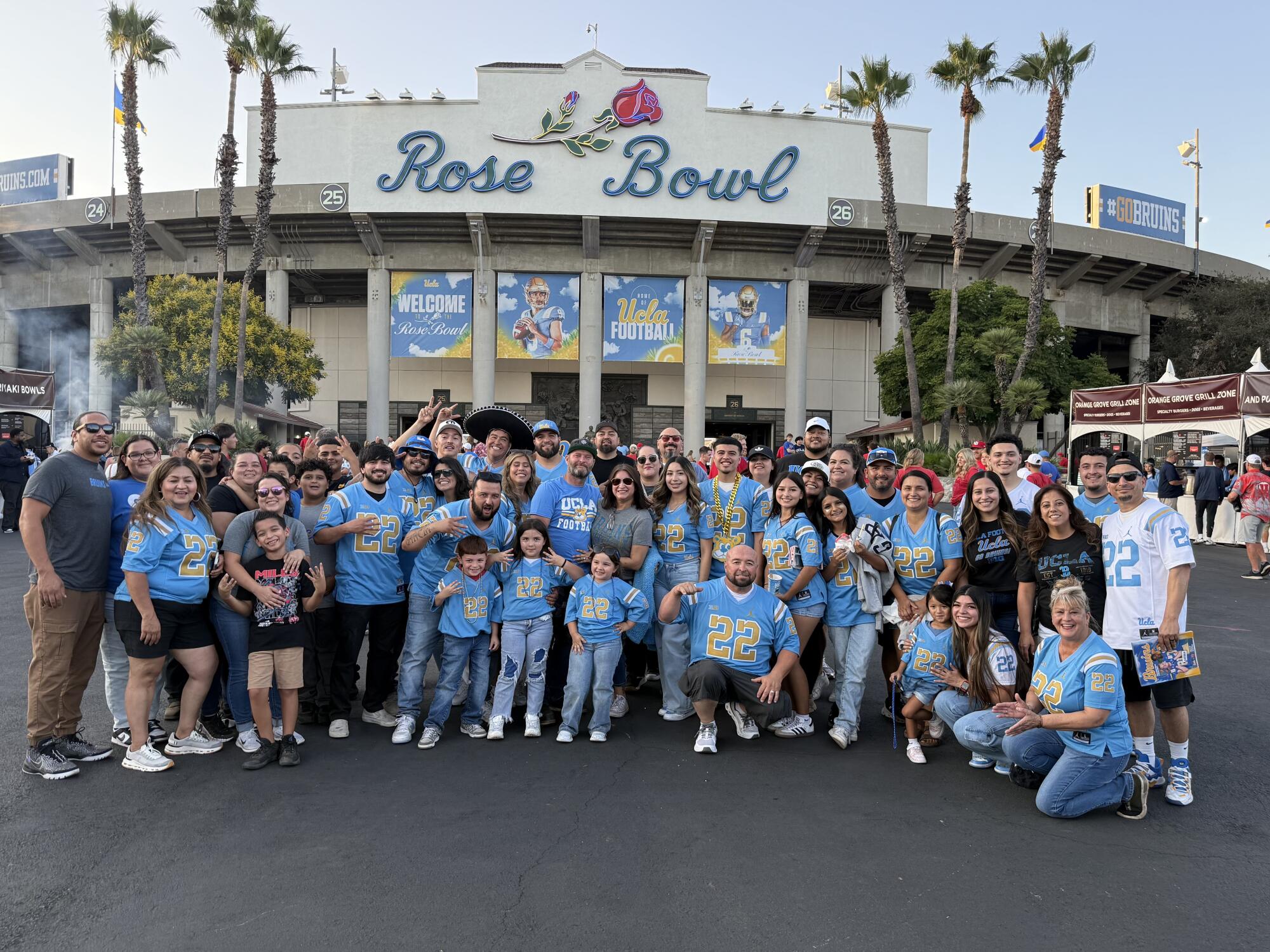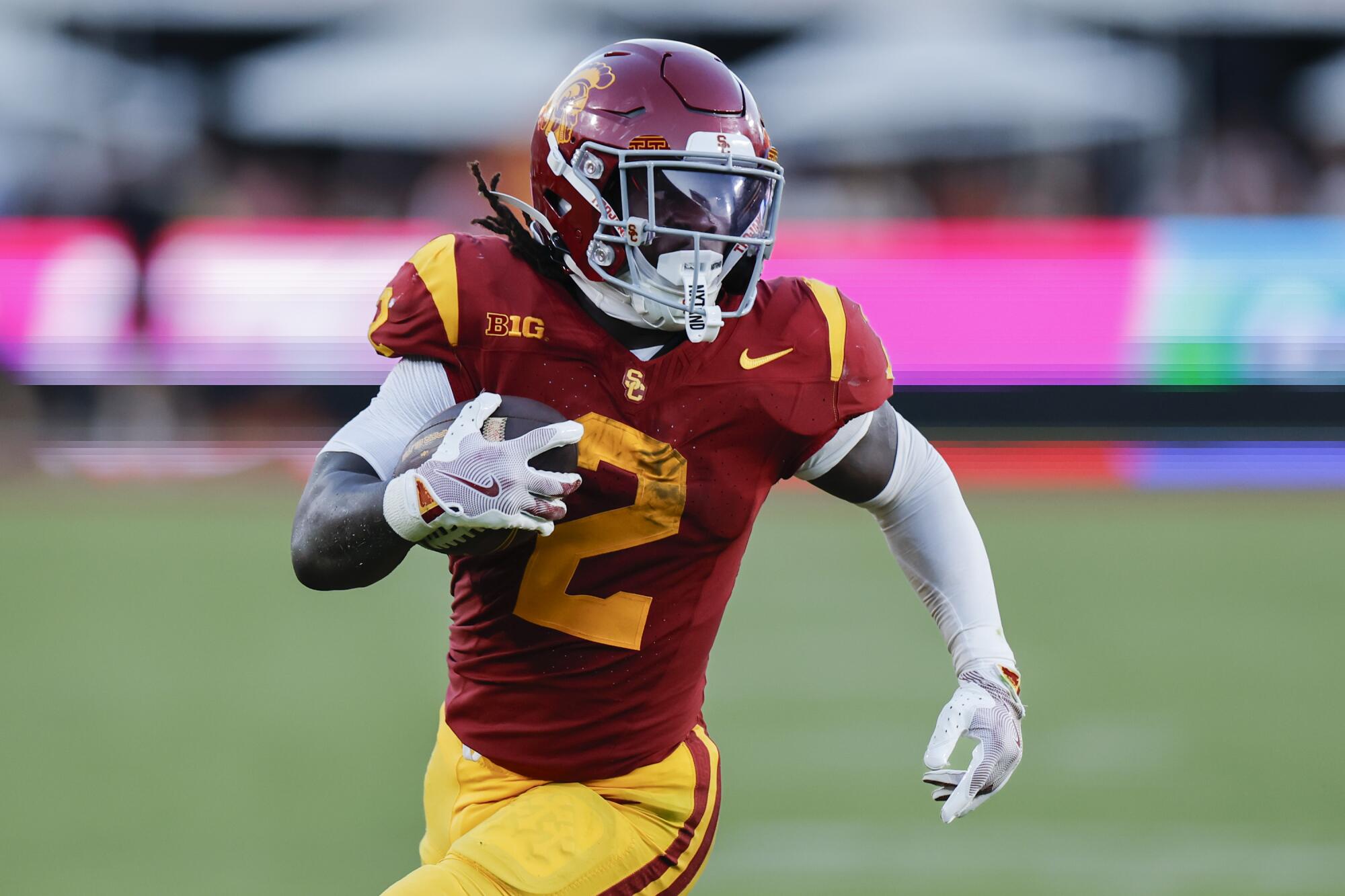Adversity made UCLA tailback Anthony Frias II’s success sweeter
His father says it all the time.
Anthony Frias II will suffer a setback, like those scary months when the UCLA running back was stuck in transfer portal limbo, unsure if his college career was over, and he’ll hear those familiar words.
It’s part of the movie.
He’ll strain in anonymity, police repeatedly coming to the door of his home at 2:30 a.m. because neighbors kept complaining about the sound of weights slamming onto the floor of the garage after another sweaty deadlift, and here comes his father’s favorite phrase again.
UCLA running back Anthony Frias II’s family gathers for a photo in front of the Rose Bowl before cheering for him and the Bruins.
(The Frias family)
It’s part of the movie.
Then there’s moments like last weekend, when something happens that makes this whole improbable journey feel like it’s just getting started, like there’s so much left to do and so many people to inspire for the kid from a tiny town in the San Joaquin Valley who once had no college scholarship offers.
Having been made a bigger part of the offensive game plan against Maryland, Frias bolted for his first career touchdown run. Later, with the Bruins needing to reach field-goal range in the game’s final moments, he chugged ahead for 35 yards, dragging defenders with him to set up the winning score.
When Frias emerged from the tunnel inside the Rose Bowl afterward to reconnect with his family, having starred inside the stadium where he once stood as a teenager with a sign proclaiming that he would play there one day, it was only a matter of time before he heard that refrain once more.
“Every time something happens, he mentions it,” the namesake son said of his father, “and it gives me a little bit more belief each time that he’s right.”
For many years, the genre of Anthony Frias II’s story seemed uncertain.
Would it be a hero’s tale? A drama about unfulfilled dreams?
The only sure thing was the conviction of the boy and his father who believed their journey would take them well beyond the confines of Le Grand, Calif., population 1,592.
Little Anthony wanted to play football so badly growing up that after suffering a hairline fracture in his knee that was supposed to sideline him for the rest of the season, he made his own rehabilitation plan.
He was only 9.
Setting his alarm for 5:30 in the morning, he’d wake his father and they would go for a 1½-mile run to a relative’s home for workouts before running back. With his team on the verge of its championship game, Anthony needed a doctor’s clearance to return ahead of schedule.
One morning, he took a crumpled piece of paper to his mom in bed. When she awoke unexpectedly, he ran away nervously. Sabrina Frias looked at the paper, which outlined his recovery and mentioned that he had been waiting for this moment his whole life.
Anthony Frias II was in high school when he stood in front of the Rose Bowl while holding up a sign that read, “One day I will play here!” and featured the Stanford logo. He realized his dream of playing in the Rose Bowl, although it was for UCLA.
(The Frias family)
Anthony left his fate in his mother’s hands, asking her to make a choice — circle the “Yes” he had written alongside a happy face or the “No” alongside a sad face.
Her heart breaking at the thought of denying her son, she circled “Yes.” Anthony went on to score every point in his team’s 20-19 victory.
By the time he was 13, Anthony had modeled his playing style after Christian McCaffrey, the dynamic Stanford running back who was making a strong push for the Heisman Trophy. That made the Christmas present he received that year — tickets to see Stanford play Iowa in the Rose Bowl — an all-time favorite.
Before the game, Anthony’s father painted a giant red “S” on his son’s bare chest. Together, they made a sign that Anthony held above his head while standing outside the stadium. It read, “One day I will play here!”
Looking back, Anthony said the sign was mostly his father’s idea.
“He just knew,” Anthony said, “that I was gonna be so special.”
Few shared that belief when Anthony was coming out of high school.
Starring for Turlock High, which was not known for producing high-level college prospects, wasn’t enough to draw interest beyond a few Division II schools. What was the recruiters’ biggest hang up?
“When they looked at him,” Anthony’s father said of someone who now stands 5-foot-10 and weighs 225 pounds, “he wasn’t the guy they wanted.”
Enrolling at Modesto Junior College, Anthony quickly rose from fourth-stringer to featured tailback during the 2021 season, topping 100 yards rushing three times and leading all California junior college players with 17 rushing touchdowns.
It was enough to earn him a scholarship offer at Kansas State.
Kansas State running back Anthony Frias II catches the ball during a game against Tulane on Sept. 17, 2022, in Manhattan, Kan.
(Colin E Braley / Associated Press)
Buried on the depth chart, he redshirted during his first season with the Wildcats. The next season, playing mostly on special teams, Anthony rarely got more than a carry or two in any game. As confident as he was in his ability, it was impossible to keep out the doubt.
He forged ahead, bolstered by his religious faith and conversations with the father who also happened to be his therapist and best friend, telling him not to worry, that things would eventually pay off.
“You know, we talk it through, I’m there for him all the time,” the elder Frias said. “I’ve been there through the tears, I’ve been there through the needing to hold my son, through the questioning, ‘What more can I do, dad?’ But he never faltered, never quit.”
He did seek a new football home.
Kansas State running back Anthony Frias II carries the ball while running into the Central Florida defense on Sept. 23, 2023, in Manhattan, Kan.
(Travis Heying / Associated Press)
Before Kansas State played its bowl game at the end of the 2023 season, Frias entered the transfer portal. Then he waited. And waited. Months went by without a new offer to play elsewhere.
“Nobody was coming, nobody was calling, there was a moment where we were just like, ‘Man, what are we going to do?’” Anthony’s father said. “We just prayed and had faith, like it’s going to work out, don’t worry.”
Sure enough, the new coaching staff at Arizona, which had pursued Anthony when it was at San José State, offered a spot as a preferred walk-on. That meant Anthony was going to have to take out student loans and pay for his own apartment in Tucson.
About a week before he was scheduled to move in, Anthony received a call from Marcus Thomas, UCLA’s running backs coach. How would you like to become a Bruin? Anthony told him that he’d need to be more than a preferred walk-on because otherwise he was just going to go to Arizona.
Less than five minutes later, UCLA offensive coordinator Eric Bieniemy called. The team agreed to cover his tuition and living expenses through name, image and likeness funds, even though he wouldn’t be on scholarship.
Done.
When Anthony giddily walked into the Rose Bowl for the first time as a player, during a practice before the 2024 season opener, he FaceTimed his parents, even going over to the seat where he and his father had watched that Rose Bowl game.
“That,” Anthony said, “was like the first full-circle moment that I had.”
Anthony’s first season as a Bruin largely mirrored his final season as a Wildcat. There was a lot of special teams work and only a few carries before an expanded role in the season finale against Fresno State.
Entering what’s likely to be his final college season, the redshirt senior earned a scholarship but no guarantee of emerging from the shadows.
As usual, his father wore his son’s No. 22 jersey last weekend when he settled into his seat in the family section inside the Rose Bowl, never imagining the name on the back would be one of the most talked about inside the stadium.
When Anthony took a handoff early in the second quarter, cutting one way and then the other before breaking a tackle on the way to a 55-yard touchdown run, his every movement was accompanied by his father’s voice in the stands.
“I’m like, ‘Oh, oh dang, oh dang!’ ” the elder Frias said. “And then I stand up, like, ‘Oh!’ and I see that [defender] chase him and I’m like, ‘Come on, Ant, turn it up!’ and then he beats the guy out to score the touchdown and I just went crazy.”
With fellow running backs Anthony Woods and Jaivian Thomas later sidelined by injuries, Anthony Frias got a few more carries. His last one, on the game’s final offensive play, captured the essence of someone who refused to quit.
Running away from one defender who tried to grab him by the shoulders, he spun away from another before finally getting dragged down at the five-yard line to set up the winning field goal on the next play.
“Just all the pain, all the suffering, all the longing, all the workouts, all the late nights, all the no-love, no-opportunity, that run signified the release of that,” his father said. “And when he came out of there, he let out his roar. He was like, ‘I won’t be denied any more.’ ”
In one game and only four carries, Anthony had piled up 97 rushing yards — exceeding the 91 yards he had tallied in the three previous seasons combined.
“He made the most of the situation,” UCLA interim coach Tim Skipper said. “He made critical plays — I mean, we’re not just talking he got some first down or something, he made critical, impact, explosive plays that changed that game and for that to happen for him, it couldn’t have happened to a better person.”
Later, emerging from the tunnel leading to the same spot outside the Rose Bowl where he had held that sign over his head almost a decade earlier, Anthony flashed a smile that his father had never seen before when he reached a jubilant throng of family and friends.
“It just was all the years of the grinding and the behind-the-scenes stuff that I’ve been going through,” Anthony said, “and you know, getting opportunities here and there doing different things and showing that I could do more.”
Everyone shouting his name, waiting their turn for a hug, the only thing missing was a climactic score and rolling credits.
You know what his father would say about that.

